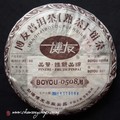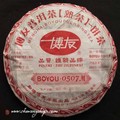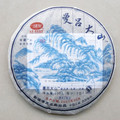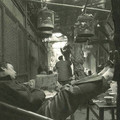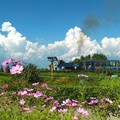Boyou Tea Factory - Teas
Tea by type
Tea by region
Tea by years and other
2005 Boyou TF 0508M Ripe Puerh Cake
 1 review
1 reviewBoyou was founded in 2005, now is one of the factories which still adhere to the strictest sanitary standard in Xishuangbanna. Boyou TF hire Master Huang An Shun who was fermentation workshop director working at the Menghai Tea factory since 1957 to be supervisor for fermentation process. 05 series ripe puerh is the first batch of products. Used 2005 fermented and matured materials, after more than six months storage, select eight grade material and blended into this...
2005 Boyou TF 0507M Ripe Puerh Cake
 1 review
1 reviewBoyou was founded in 2005, now is one of the factories which still adhere to the strictest sanitary standard in Xishuangbanna. Boyou TF hire Master Huang An Shun who was fermentation workshop director working at the Menghai Tea factory since 1957 to be supervisor for fermentation process. 05 series ripe puerh is the first batch of products. Used 2005 fermented and matured materials, after more than six months storage, select 7th grade material and blended into this...
2007 Boyou "Man Lu Da Shan" Meng Song
 2 reviews
2 reviewsBoyou tea factory was started by yet another ex-Menghai tea blender. Boyou is well known for showcasing Menghai tea mountains and making Ripe Pu-erhs that rival Da Yi ripe teas. This particular tea cake was the Silver Prize winner at the 2007 Tea Culture Exhibition in Chengdu. It is a tea produced entirely from Meng Song mountain tea trees. Meng Song tea trees are well known for being a slightly smaller leaf varietal that was the result of cross-breeding several hundred years ago. The tea...
Theme
Quotes
„Fermentation is a tea production style in which the tea leaves undergo microbial fermentation and oxidation after they are dried and rolled. This process is a Chinese specialty and produces tea known as Hei Cha (黑茶), commonly translated to dark, or black tea (this type of tea is completely different from what in West is known as "black tea", which in China is called "red tea"). “
Latest posts
01.01.2016 @ 18:14:35 - Eternal Spring:
WeRateTea.com wish you all the best for 2016!...
07.12.2015 @ 09:07:02 - sypalino:
I decided to taste this tea 2 weeks after delivery. The cake is lightly pressed, so...
09.11.2015 @ 21:58:19 - Eternal Spring:
Comparison of 2013 Bada Pu-erh.sk with <a...
09.11.2015 @ 09:34:07 - Eternal Spring:
Lao Yu 2013 is now about 2,5 years old tea and out of this 1,5 year stored in Europe....
09.11.2015 @ 09:33:11 - Eternal Spring:
Comparison of all three Lao Yu is now done :)
15.10.2015 @ 11:06:37 - Eternal Spring:
2015 Chawangpu Collection – I can only tell, that all teas are very good :)
09.10.2015 @ 10:31:19 - Eternal Spring:
It was quite long and difficult tasting to make a decision… There is still quite...
24.01.2015 @ 16:55:57 - Eternal Spring:
WeRateTea.com wish you all the best for 2015!...
30.12.2014 @ 17:19:22 - Eternal Spring:
"FT(For Taiwan)" means this brick was a special order of "Fei Tai" Company. Fei Tai...
13.08.2014 @ 18:24:28 - Eternal Spring:
We compared two teas from Youle. 2005 Jinuo Shan You Le "Red Sun Drum" and 2009...
Tea by region
We will help you with tea selection.
Do you like quality loose tea?
We will help you to find the right one for you. Be inspired by tea ratings of other tea lovers. Rating stars could help you.


Review your cup of tea.
Review the tea you are drinking and help other tea lovers to find the right cup of tea.






 Shops
Shops
